- Home
- Margaret Brownley
A Match Made in Texas Page 2
A Match Made in Texas Read online
Page 2
Clearly, she was a woman who could cause a man all sorts of trouble if he didn’t watch out. Even so, the way she’d handled herself in the face of danger had earned his begrudging respect.
He also felt sorry for her. It was hot and humid and dusty, the air thick as a wet blanket. She had to be downright miserable but was either too polite or too stubborn to admit it. If he was a betting man, he’d put his money on the latter. He urged his horse to go faster. The lady looked like she could use some shade and a cold drink. The last thing he needed was her passing out on him.
The sun hung low, and shadows ran long by the time they reached Two-Time. The town was larger than he expected. A railroad stretched the length of the town, along with a string of saloons. A street two wagons wide separated rows of adobe and brick buildings, each with false wooden fronts. They passed a general store, bakery, gun shop, post office, and barber along with other businesses.
“What kind of name is that, anyway? Two-Time?” he asked. “Doesn’t sound like a very trustworthy name for a town.”
“It’s not what you think,” she said. “Until last year, the town had two time zones.” She gave him a short history of the two feuding jewelers, including her father, who kept the town divided for years by refusing to agree to standard time.
Rick had little interest in town history. He was more concerned about the lay of the land. “Where shall I drop you off?” he asked abruptly.
She hesitated. “At my father’s place. It’s two blocks up yonder. At the Lockwood Watch and Clockworks shop.”
He tossed a nod toward a knot of people blocking the street. “Looks like trouble.”
She craned her neck. “No more than usual.”
He raised an eyebrow. Where he came from, trouble didn’t usually start till the sun went down. Something about the night made prisoners restless.
But here in broad daylight, the mass of people spilled off the boardwalk and into the street. Traffic had come to a complete standstill, preventing him from driving any farther. Tugging on the reins, he guided his horse to the side of the road and parked behind a dogcatcher’s wagon.
“You can let me off here,” she said.
“Sure?” He slanted his head to the back. “Your hope-a-thingie weighs a ton.”
“I can manage,” she said.
Setting the brake, he leaped to the ground and hauled her chest out of the wagon and onto the wooden sidewalk. This time, he showed more care in setting it down. A chip in the wood the size of a quarter drew his attention, and he rubbed his finger over it.
He heard her gasp and looked up. For an independent woman, she sure did put a lot of stock in that old chest. Or maybe it was the finery inside…
“It’s just a bullet hole,” he assured her. “Probably passed right through all that satin and lace.”
Her slender frame stiffened, and her cheeks turned a most beguiling red. She really was a looker. Especially now that she’d lost that ridiculous hat.
At first glance, her turquoise eyes had seemed too large for her delicate features and her body too slight to support such an independent spirit. Now that she was in familiar surroundings, she’d dropped her guard, and all the mismatched parts worked together to create a very pleasant whole.
He touched the brim of his hat with the tip of his finger. “Sure you don’t need help with your—”
“No, that’s fine,” she said quickly, avoiding his eyes. “I can manage from here. Much obliged.”
He watched the late afternoon sun play with the golden highlights of her brown hair. Why a woman would want to hide such a fine mane beneath a ridiculous bunch of bird feathers was one of the mysteries of life.
She gazed up at him through a fringe of lush lashes. “If you need a place to stay, we passed the hotel back a ways. There’re also a couple of boardinghouses in town. Some of them are even respectable.”
“In that case, I’ll stay at the hotel.” With a tip of his hat, he forced himself to turn away, starting off on foot. Since the street was still blocked, there was no sense trying to drive his wagon. He’d come back later to stable his horse. Without the distraction of Miss Lockwood, he could concentrate more fully on the town. This time, he paid particular attention to the location of the bank, the sheriff’s office, and the hotel.
This town was everything he hoped for and more. It was large enough for a man to remain relatively unnoticed, yet small enough to escape quickly should a need arise.
All in all, it was a perfect hideout for a cold-blooded killer.
Three
Surprised to find herself staring at Mr. Rennick’s retreating back, Amanda grasped the handle of her hope chest and dragged it along the boardwalk toward her father’s clock shop. The cedar-lined chest bounced up and down over the rough-hewn wooden sidewalk.
The bullet hole worried her. Maybe the carpenter, Mr. Woodman, would take a look at it. If anyone could make the hope chest look like new again, he was the man.
Right now, her main concern was reaching her father’s shop before closing time so as to hitch a ride home with him.
The weeklong suffragist meeting had been exhausting but also exhilarating. She’d learned much from the other attendees and was in awe at the many things that had been accomplished since the last quarterly meeting. Her own efforts for the cause seemed woefully lacking in comparison.
One member got her hometown to change the law forbidding women to own businesses. Another was elected to a school board, the first woman in Missouri to do so. Even that annoying Marilyn Hock had something impressive to brag about. She had single-handedly persuaded a New Orleans cotton mill to cut women’s work hours from fourteen to twelve hours a day.
When it came her turn, Amanda was one of only two women with no meaningful news to report. All the marches and rallies she’d spearheaded had failed to produce a single positive outcome for women’s rights. All she got for her efforts was a ruined reputation and more jail time than she cared to admit.
The next suffragist meeting was scheduled for June. That was only three months away, and she had no time to lose. Next time, she would have something positive to report if it killed her. But what?
Her thoughts scattered as she neared the knot of people blocking both the street and boardwalk. Angry voices escalated, and fists punched the air. Curious, she moved closer, dragging her hope chest behind her. What had the town up in arms this time? It didn’t take much to get folks riled, but this dispute sounded more serious than most.
The blacksmith’s strident voice rose above the rest. “I’m tellin’ you, this town is goin’ to the dogs.” Mr. Steele paused to make sure he had everyone’s attention, his powerful arms hanging past his knees like an ape’s. “We ain’t got nottin’ but crime and disorder, and it’s smudgin’ our town’s reputation. It’s time to put a stop to it!”
“You tell ’em!” someone shouted.
Furrowing her brow, Amanda moved closer. Something must have happened in her absence. Not too surprising. Crime had increased at an alarming rate in recent months and was now the main topic of discussion at every gathering. Horse theft and cattle rustling were the least of it. There had been two bank robberies in the last couple of months alone.
Some blamed the railroad. Others held the slowing cattle trade responsible, as many cowpunchers were now out of work. A few suggested it was a sign of the times.
Anxious to find out what happened to cause such an uproar, Amanda rose on tiptoes and craned her neck. Still, the high-crowned hats blocked her vision.
Hiking her skirt above her ankles, she stepped atop her hope chest. This gave her the height needed for a clear view.
Mayor Troutman faced the crowd, thumbs hooked from the pockets of his waistcoat. A round-bellied man with heavy jowls and bushy sideburns, his girth was impressive even if his leadership was not. A year in office and already his campaign promises had turned in
to excuses.
“The stage robbery is the last straw,” he said in a deep-chested voice.
Amanda’s jaw dropped. The stage was held up? The one she had been kicked off of?
Unbelievable!
The mayor’s voice grew more insistent. “What we need is a sheriff who will clean up this town once and for all. I have asked for Sheriff Appleby’s resignation effective immediately. That means we have no time to waste in selecting someone to take his place.”
Amanda groaned. Not again. The town changed sheriffs more often than fashion changed styles. The Texas constitution specified a two-year term for sheriffs, but things like that never bothered the residents of Two-Time.
If citizens saw no results in a few months—and, in some cases, weeks—the sheriff was booted out and another one installed, usually less capable than the one they’d replaced.
“So who’s it gonna be this time?” called the postmaster.
“That’s what we’re here to find out,” Mayor Troutman said. “We’re gonna do this in the usual dem’cratic way. Everyone interested in the job will get their name added to this here board. Then Friday, we’ll have a fair and proper vote.” He pulled out a square of paper from his vest pocket and unfolded it.
“Just so there’s no question, here’s what the job entails.” He then began reading aloud. “The sheriff’s duty is to quiet and suppress all riots.” He glanced pointedly at Amanda, no doubt recalling the riot she caused after trying to close the saloons on Sundays.
He continued reading. “The sheriff will furthermore appr’hend and secure any person guilty of committin’ a felony or”—his gaze lit on Amanda—“disturbin’ the peace.”
Amanda glared back. She was still riled about the night spent in jail for carrying a picket sign during the mayor’s speech. Disturbing the peace indeed!
Since Two-Time was a relatively small town and the only one of any consequence in the county, the sheriff’s duties also included the unpleasant task of collecting taxes.
“Any questions?” Troutman asked, folding the paper and stuffing it back in his pocket.
When no questions were forthcoming, the mayor continued. “All right, men.” He peered at the crowd from beneath bushy eyebrows. “Who’s gonna be the first to step up and do his civic duty?”
The pox-scarred butcher everyone called T-Bone raised his hand. His stained white apron reached his ankles but barely stretched around his equator. “I am.”
“Whatcha want to be sheriff for?” the mayor asked.
“Give me a chance to catch the culprit who stole me side of beef.”
“What’s your qualifications?” someone yelled.
The butcher looked insulted, and his horseshoe mustache quivered. “Grinding meat,” he said to appreciative laughter.
Amanda gritted her teeth. The man thought nothing of shortchanging his customers. The idea of him in charge of law and order horrified her.
The mayor wrote his name on the board. “Anyone else?”
Mr. Mutton, the dogcatcher, raised his hand. A thin man with a flat face and receding jaw, he bore a striking resemblance to a bulldog. “Trackin’ down outlaws can’t be any harder than trackin’ down stray dogs.”
Amanda clenched her hands by her side. The man was as unscrupulous as they came, and no dog, licensed or otherwise, was safe from his greedy paws.
The mayor wrote the dogcatcher’s name on the board. “So far we have two candidates. Anyone else brave enough to put their name where their mouth is?” Hands went up all around, and soon, a dozen or so candidates had tossed their hats in the ring.
Amanda was just about to step down from her hope chest when something occurred to her. Running for sheriff would surely score points at the next women’s suffrage meeting. No other member had run for sheriff. She would be the first. Now wouldn’t that be something to crow about? Even that annoying Marilyn Hock would have to be impressed.
She raised her hand. “Add my name.”
Never in a million years did she expect to be elected to such a post, but neither did she want to pass up the opportunity to promote her cause. Adding her name to the growing list of candidates would send a message that women were just as qualified to serve as men. Certainly, she couldn’t do any worse than the men already listed.
Silence brittle as glass followed her declaration, and all eyes turned to her.
The mayor dismissed her with a shake of his head. “You can’t run. You’re not qualified.”
“Why aren’t I qualified?” she demanded.
“You’re a woman, that’s why!” he bellowed back. “And it’s against the law for women to vote.”
“I’m not asking to vote,” she argued. “I’m voicing my intention to run. Far as I know, that’s not against the law.”
What she was doing wasn’t all that groundbreaking. That honor went to Victoria Woodhull, who ran for president of the United States against incumbent Ulysses S. Grant. The fact that Miss Woodhull couldn’t vote for herself didn’t stop her, and neither would it stop Amanda.
Banker Mr. Mooney spoke up. “She’s got a point there.” His curling gray mustache twitched as he fiddled with his watch fob. “Nothing in the law says she can’t run.”
“I say she can’t run,” T-Bone said. “Not only is she not a man, she ain’t got no qual’fications.”
“He’s right,” the owner of the Lazy B Ranch yelled. “What makes ya think ya got what it takes to be sheriff? What do ya know about law and order? What experience ya got?”
Amanda folded her arms across her chest and glared down at him. Thanks to the hope chest, she stood several inches taller than any of the men, and that gave her a definite advantage. “I’ll have you know I have lots of experience. I’ve been arrested a time or two.” Or three. Once for voting in the mayor’s election, a second time for trying to close a saloon on the Sabbath. A third time, she and a dozen other suffragists were arrested for blocking traffic and frightening the mayor’s horse as they marched down the middle of Main Street. “How many times have you been arrested?”
“I…I…”
“Just as I thought,” she said. “If you’ve never been arrested, how can you possibly know how the system works?”
“She has a point,” Mr. Mooney said and scratched his head. A pompous man with a muttonchop beard, his body bore a striking resemblance to an overstuffed money bag. “Least I think she does.”
“Have you ever fired a weapon?” Mayor Troutman asked.
“Yes,” she said, nodding. Now they were getting somewhere. “I have fired a weapon.” Less than four hours ago, as it turned out.
The mayor’s lip curled. “Has anyone ever seen you fire a weapon?”
“I have.”
Recognizing the gruff voice, Amanda nearly fell off the hope chest.
All eyes turned to the newly arrived stranger.
“And who might you be?” the mayor asked.
“R. B. Rennick’s the name.”
Troutman frowned. “Under what circumstances did you see Miss Lockwood fire a weapon?”
“She fired at three outlaws who were out to do us both”—he locked gazes with her—“nefarious harm. Once she got to firin’, they took off like a bunch of skinned mules. Lest I’m mistaken, those were the same thieves who robbed the stage.”
Everyone started talking at once. Grimacing with impatience, the mayor waved his arms. “Quiet!” He waited until he had everyone’s attention. “It seems that despite having the misfortune of bein’ of the female persuasion, Miss Lockwood is indeed qualified to run for sheriff.”
He turned toward the board and scribbled her name beneath the names of the other candidates…albeit in a much smaller print. “Anyone else?”
No one else spoke up, and Troutman continued. “All right, men. Voting will commence on Friday at noon sharp.”
T
he crowd quickly dispersed. Leaving her hope chest behind, Amanda rushed to catch up to Mr. Rennick. “Why’d you do that?” she asked, falling in step by his side.
He swung around to face her, reminding her once again of his height. “Why not?”
“You said you were against women’s rights.”
He grimaced. “I have no problem with female rights. I just don’t like sufferin’ women.”
“If you’re so against suffragists, why the endorsement?”
“That was no endorsement. Just telling it how it was. You and your crazy hat sent those hombres fleein’ like a bunch of yellow hounds. Can’t deny that.” He narrowed his eyes. “You aren’t serious about runnin’, are you? It’s a joke, right?”
“I don’t joke, Mr. Rennick. And, I suspect, neither do you.”
He regarded her with a look of surprise. “Now what do you know? Seems like you and me have a lot in common. We have the same taste in women’s under-riggin’s, and we’re both serious-minded.” Without another word, he walked around his horse and, with one easy move, swung onto his wagon’s driver seat.
Refusing to be intimidated, she glared up at him, hands at her waist. “A gentleman wouldn’t mention a woman’s personal…garments,” she called.
“Probably not,” he said, and this time, she detected a touch of humor in the blue depths of his eyes. “Fortunately, no one’s ever accused me of bein’ a gentleman. I suspect no one’s ever accused you of bein’ a lady, either. Somethin’ else we have in common.” With that, he clicked his tongue and drove away.
Four
Amanda answered the door early the very next morning to find her two sisters standing on the porch, staring at her over the morning paper. The headlines screamed out the news in big, bold headlines. WOMAN RUNNING FOR SHERIFF. Below in smaller but equally bold type, she read: POLITICS HAVE BEEN RAISED TO A NEW LOW.

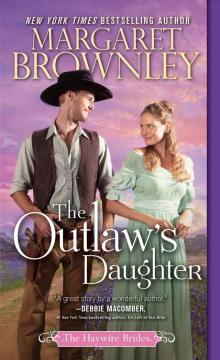 The Outlaw's Daughter
The Outlaw's Daughter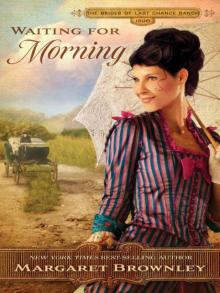 Waiting for Morning (The Brides Of Last Chance Ranch Series)
Waiting for Morning (The Brides Of Last Chance Ranch Series) Do You Hear What I Hear?
Do You Hear What I Hear? The 12 Brides of Summer Novella Collection #3
The 12 Brides of Summer Novella Collection #3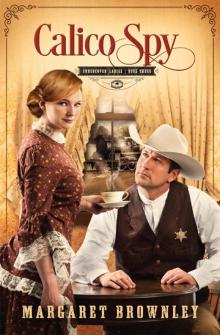 Calico Spy
Calico Spy Cowboy Charm School
Cowboy Charm School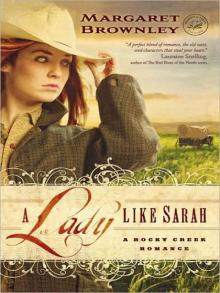 A Lady Like Sarah
A Lady Like Sarah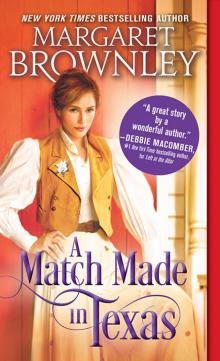 A Match Made in Texas
A Match Made in Texas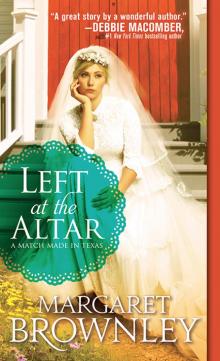 Left at the Altar
Left at the Altar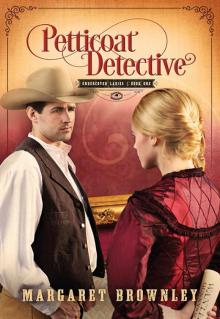 Petticoat Detective
Petticoat Detective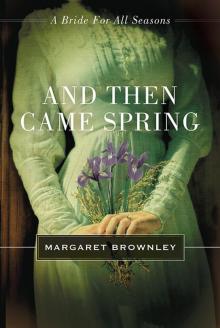 And Then Came Spring
And Then Came Spring Log Cabin Christmas
Log Cabin Christmas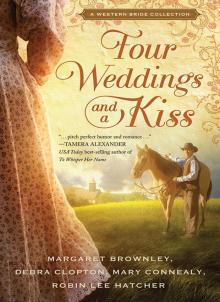 Four Weddings and a Kiss
Four Weddings and a Kiss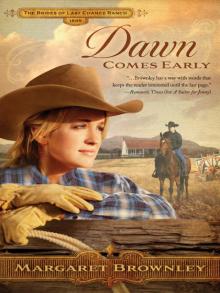 Dawn Comes Early
Dawn Comes Early